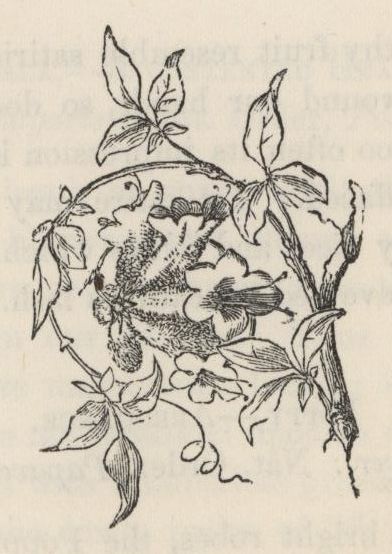






Amidst the rage of the tempests and the thunder’s roar, the Oak stands firmly, and seems to look fearlessly upon the angry elements, like souls that, strengthened by God, remain unshaken by the storms that assail them.
Fair plant, harbinger of all that is beautiful and holy, it was by thee our forefather Noah knew that the Almighty had revoked His dread sentence, and restored peace to the earth.
The fragrant and snowy blossoms of the Orange have ever been considered emblematic of virginity, that gem which shines so brightly in the crown of Heaven’s immaculate Queen. This too is the mark of the chosen souls who follow the Lamb, and whose happy lips are privileged to sing a canticle which no other tongue may utter.
Noble tree, thou bearest an aspect which all must admire. Whether clothed in thy summer beauty, or stripped by the wintry winds, thou art ever the same; and ever raising thy head to heaven, thou seemest to bid me take courage, and trust to the protecting arm of God, for strength amid the dangers and difficulties that may beset my path.
It was a beautiful summer morning; the sun shone
brightly upon the glittering waters of a pleasant river,
and upon the verdant fields that stretched along its
banks. Two fair children were sporting among the
flowers; they chased the gay butterflies until their little
feet were weary; then they seated themselves on the
mossy banks of the stream.
There was an air of restless, childish pride about
the little girl, which, beautiful as she was, made one
turn from her with sadness; but it was not so with her
brother, who, as he stood there, with his golden curls
floating on his shoulders, looked the very image of
beauty and innocence. “See, sister,” said the boy,
“yon fair lily which is growing so near the water’s
edge. Let us run and see who will get it first.”
Off they both flew; the little boy was the first to
reach the flower; he stretched out his hand to pluck it,
but, in her eagerness and disappointment, his sister violently
pushed the child aside. His feet slipped upon the
smooth, grassy bank, and the next instant he was struggling
in the waters beneath.
Terrified at the consequences of her youthful impetuosity,
his sister called aloud for help, filling the
air with her cries, but it was in vain; the boy was
borne away by the swift current. For a few moments,
his cries reached her, and then an ominous silence told
that the beautiful child had perished in the cruel waters.
In an agony of grief and despair, his sister threw herself
upon the ground. Presently she heard a low voice
near her, and raising her head, she beheld the Angel of
the Flowers.
“I come not to reproach you,” said the spirit; “for
I know you intended not the death of your brother; but,
as a warning to all who yield to jealousy and passion,
this lily shall shine no more among its fair sisters.”
As the angel pronounced these words, a deep yellow
tint overspread the snowy corolla of the flower, it was
no longer the white lily that raised its lovely head towards
the bright sunshine, and expanded its fair chalice
to receive the dews of heaven; no longer the peerless
emblem of pure and holy souls; but doomed to be the
type of angry passions,—the silent witness to the evils
which those passions bring upon the world.
